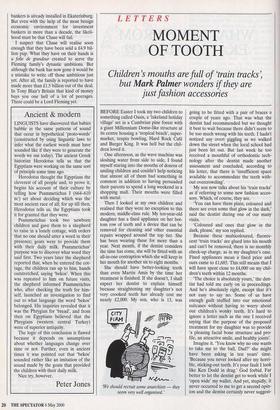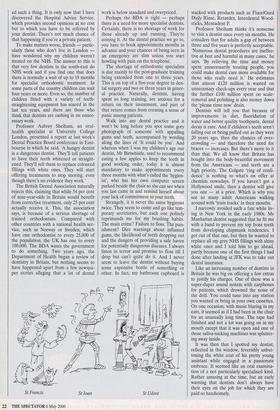LETTERS
MOMENT OF TOOTH
Children's mouths are full of 'train tracks',
but Mark Palmer wonders if they are
just fashion accessories
BEFORE Easter I took my two children to something called Oasis, a `lakeland holiday village' set in a Cumbrian pine forest with a giant Millennium Dome-like structure at its centre housing a `tropical beach', super- market, tenpin bowling, Hard Rock Café and Burger King. It was hell but the chil- dren loved it.
One afternoon, as the wave machine was sloshing water from side to side, I found myself staring into the mouths of dozens of smiling children and couldn't help noticing that almost all of them had something in common in addition to having persuaded their parents to spend a long weekend in a shopping mall. Their mouths were filled with metal.
Then I looked at my own children and realised that they were no exception to this modem, middle-class rule. My ten-year-old daughter has a fixed appliance on her bot- tom row of teeth and a device that can be removed for cleaning and other essential repairs wrapped around the top tier. She has been wearing these for more than a year. Next month, if the dentist considers the time has come, she will be fitted with an all-in-one contraption which she will keep in her mouth for another six to eight months.
She should have better-looking teeth than even Martin Anus by the time her treatment is finished. If she doesn't, I shall expect her dentist to explain himself because straightening my daughter's not very crooked teeth has already cost me nearly £2,000. My son, who is 13, was `We should recruit some anarchists — they seem my well organised.' going to be fitted with a pair of braces a couple of years ago. That was what the dentist had recommended but we thought it best to wait because there didn't seem to be too much wrong with his teeth. I hadn't noticed any overt giggling as we walked down the street when the local school had just been let out. But last week he too received a mouthful of orthodontic tech- nology after the dentist made another assessment and concluded, according to his letter, that there is `insufficient space available to accommodate the teeth with- out overcrowding'.
My son now talks about his `train tracks' as if referring to some new fashion acces- sory. Which, of course, they are.
`You can have them plain, coloured and there are even some that glow in the dark,' said the dentist during one of our many visits.
`Coloured and ones that glow in the dark, please,' my son replied.
Because these multicoloured, fluores- cent `train tracks' are glued into his mouth and can't be removed, there is no monthly check-up charge, as in my daughter's case. Fixed appliances mean a fixed price and ours came to £1,685. This still means that I will have spent close to £4,000 on my chil- dren's teeth within 12 months.
`The choice is absolutely yours,' the den- tist had told me early on in proceedings. And he's absolutely right, except that it's not easy to say no. Some of us have enough guilt stuffed into our emotional suitcases without having to worry about our children's wonky teeth. It's hard to ignore a letter such as the one I received saying that the purpose of the proposed treatment for my daughter was to provide `a pleasing facial bone structure and pro- file, an attractive smile, and healthy joints'.
Imagine it. 'You know why no one wants to take me to the ball, Dad?' she might have been asking in ten years' time. Because you never looked after my horri- ble, sticking-out teeth. It's your fault I look like Ken Dodd in drag.' God forbid. Far better to let the dentist get to work while I `open wide' my wallet. And yet, stupidly, it never occurred to me to get a second opin- ion and the dentist certainly never suggest- ed such a thing. It is only now that I have discovered the Hospital Advice Service, which provides second opinions at no cost but to which you have to be referred by your dentist. There's not much chance of that happening if you're a private patient.
To make matters worse, friends — partic- ularly those who don't live in London have wondered why my children weren't treated on the NHS. The answer to this is that very few dentists in the south-east do NHS work and if you find one that does there is normally a wait of up to 18 months for specialist orthodontic treatment. In some parts of the country children can wait four years or more. Even so, the number of children fitted with a variety of teeth- straightening equipment has soared in the last ten years, and there are those who think that dentists are cashing in on unnec- essary work.
Professor Aubrey Sheiham, an oral- health specialist at University College London, presented a report at last week's Dental Practice Board conference in East- bourne in which he said, 'A hungry dentist is a dangerous dentist. They'll tell patients to have their teeth whitened or straight- ened. They'll tell them to replace coloured fillings with white ones. They will start offering treatments to stop snoring, even though there's no evidence they work.'
The British Dental Association naturally rejects this, claiming that while 54 per cent of nine-year-olds in Britain would benefit from corrective treatment, only 25 per cent actually receive it. This, the association says, is because of a serious shortage of trained orthodontists. Compared with other countries with a national health ser- vice, such as Norway or Sweden, which have one orthodontist to every 25,000 of the population, the UK has one to every 100,000. The BDA wants the government to do something. Two years ago, the Department of Health began a review of dentistry in Britain, but nothing seems to have happened apart from a few newspa- per stories alleging that a lot of dental work is below standard and overpriced.
Perhaps the BDA is right — perhaps there is a need for more specialist dentists. Certainly, there is no shortage of work for those already up and running. They're coining it. At the dental practice we go to, you have to book appointments months in advance and your chances of being seen in an emergency are slim unless you start howling with pain on the telephone.
The shortage of orthodontic specialists is due mainly to the post-graduate training being extended from one to three years. This is on top of a five-year degree in den- tal surgery and two or three years in gener- al practice. Naturally, dentists, having spent so long training, are anxious for a return on their investment, and part of that return comes from creating a sense of panic among patients.
Walk into any dental practice and it won't be long before you spot some gory photograph of someone with appalling gums and teeth, accompanied by wording along the lines of 'It could be you'. And whereas when I was my children's age our dentist, Mr Birtwhistle, used to recommend eating a few apples to keep the teeth in good working order, today it is almost mandatory to make appointments every three months with what's called the 'hygien- ist', who has her own computer screen parked beside the chair so she can see when you last came in and remind herself about your lack of commitment to your teeth.
Strangely, it is never the same hygienist twice. They seem to come and go like tem- porary secretaries, but each one politely reprimands me for my brushing habits. The main crime? Failure to floss. The pun- ishment? Dire warnings about inflamed gums, the likelihood of teeth dropping out and the dangers of providing a safe haven for potentially dangerous diseases. I always listen in terror and promise to floss till I drop but can't quite do it. And I never seem to leave the dentist without buying some expensive bottle of something or other. In fact, my bathroom cupboard is St Francis St Joan St Udent stacked with products such as FluoriGard Daily Rinse, Retardex, Interdental Wood- sticks, Mentadent P.
Professor Sheiham thinks it's nonsense to visit a dentist once every six months. He considers that for adults a gap of between three and five years is perfectly acceptable. `Numerous dental procedures are ineffec- tive at best and harmful in many cases,' he says. 'By relieving the time and money spent unnecessarily treating people, you could make dental care more available for those who really need it.' He estimates that almost £120 million is wasted on unnecessary check-ups every year and that the further £100 million spent on scale- removal and polishing is also money down the 'please rinse now' drain.
Dentists will tell you that because of improvements in diet, fluoridation of water and better quality toothpaste, dental decay is rare. And if children's teeth aren't falling out or being pulled out as they were 20 years ago, then the chances of over- crowding — and therefore the need for braces — increases. But there's more to it than that. We all know that Britain has bought into the body-beautiful movement from the Americans — and teeth are a high priority. The Colgate 'ring of confi- dence' is nothing to what's on offer at chemists nowadays. If you haven't got a Hollywood smile, then a dentist will give you one — at a price. Which is why you see so many adult Americans walking around with 'train tracks' in their mouths.
I narrowly avoided such a fate while liv- ing in New York in the early 1980s. My Manhattan dentist suggested that he fit me with a band to prevent my top front teeth from developing chipmunk tendencies. I got out of that one, but then he wanted to replace all my grey NHS fillings with shiny white ones and I told him to go ahead, partly because one of the first things I had done after landing at JFK was to take out dental insurance.
Like an increasing number of dentists in Britain he was big on offering a few extras to justify his charges. One of these was a super-duper sound system with earphones for patients, which drowned the noise of the drill. You could tune into any station you wanted or bring in your own cassettes. On one occasion, with music blaring in my ears, it seemed as if I had been in the chair for an unusually long time. The tape had finished and not a lot was going on in my mouth except that it was open and one of those saliva-sucking machines was splutter- ing away inside.
It was then that I spotted my dentist, reflected in the window, feverishly unbut- toning the white coat of his pretty young assistant while engaged in a passionate embrace. It seemed like an oral examina- tion of a not particularly specialised kind. Rather amusing at the time, but an early warning that dentists don't always have their eyes on the job for which they are paid so handsomely.



































































 Previous page
Previous page